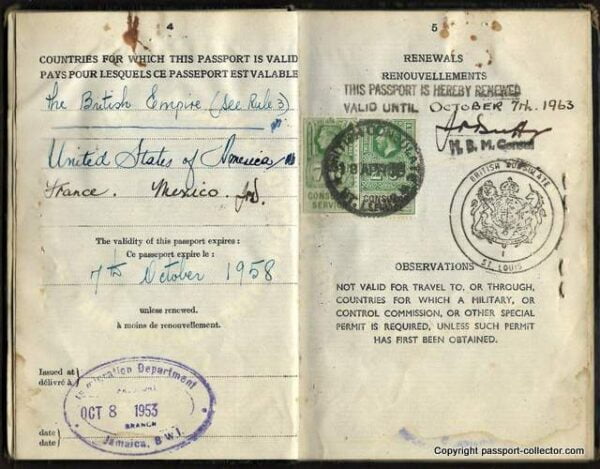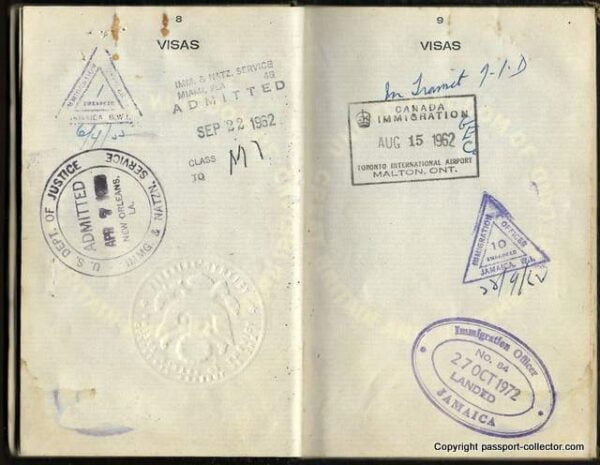British Jamaica passport 1953 for a soldier
You see here a marvelous travel document from British Jamaica issued to a young soldier in uniform in 1953, well before Jamaicas’ independence in 1962. Attractive is also the revenue stamps on page one. His passport was valid for the British Empire, the United States of America, France, and Mexico. The documents’ initial validity was renewed later until 1963. Attached to the passport is an examination card of the bearer – Baron Wilberforce Everan Mapletoft Duncan.


In 1955 the American Consulate General in Kingston, Jamaica, issued him a Non-Immigrant visa, furthermore several stamps, including Canada in Aug 1962, the USA in Sep 1962 (after Independence). The Jamaican immigration stamp from 1972 is not clear for me as his passport was then already expired (since 1963). There is also a US immigration stamp from 1978 – fifteen years are his passport was expired!


Path to Independence, 1945–62 British Jamaica Passport
As World War II came to a close, a sweeping movement of decolonization overtook the world. British Government and local politicians began a long transition of Jamaica from a crown colony into an independent state. The political scene was dominated by PNP and JLP, with the houses of legislature switching hands between the two throughout the 1950s. After Norman Manley was elected Chief Minister in 1955, he sped up the process of decolonization via several constitutional amendments. These amendments allowed for greater self-government and established a cabinet of ministers under the Prime Minister of Jamaica.
Under Manley, Jamaica entered the West Indies Federation, a political union of colonial Caribbean islands that, if it had survived, would have united ten British colonial territories into a single, independent state. Jamaica’s participation in the Federation was unpopular, and the results of the 1961 West Indies referendum held by Premier Manley cemented the colony’s withdrawal from the union in 1962. The West Indies Federation collapsed later that year following the departure of Trinidad and Tobago.
Independence British Jamaica Passport
In the elections of 1962, the JLP defeated the PNP, resulting in Alexander Bustamante’s ascension to the premiership in April of that year. On 19 July 1962, the United Kingdom Parliament passed the Jamaica Independence Act, granting independence as of 6 August with The Queen as Head of State. On that day, the Union Jack was ceremonially lowered and replaced by the Jamaican flag throughout the country. Princess Margaret opened the first session of the Parliament of Jamaica on behalf of The Queen. With Jamaica’s independence, the Cayman Islands reverted from being a self-governing territory of Jamaica to direct British rule.
First Prime Minister of Jamaica
Sir William Alexander Clarke Bustamante GBE PC (born William Alexander Clarke; 24 February 1884 – 6 August 1977) was a Jamaican politician and labor leader, who, in 1962, became the first prime minister of Jamaica until 1967. While independence is widely celebrated within Jamaican society, it has become a subject of debate. In 2011, a survey showed that approximately 60% of Jamaicans “think the country would be better off today if it were still under British rule,” citing years of social and fiscal mismanagement in the country.
FAQ Passport History
Passport collection, passport renewal, old passports for sale, vintage passport, emergency passport renewal, same day passport, passport application, pasaporte passeport паспорт 护照 パスポート جواز سفر पासपोर्ट
1. What are the earliest known examples of passports, and how have they evolved?
The word "passport" came up only in the mid 15th Century. Before that, such documents were safe conducts, recommendations or protection letters. On a practical aspect, the earliest passport I have seen was from the mid 16th Century. Read more...
2. Are there any notable historical figures or personalities whose passports are highly sought after by collectors?
Every collector is doing well to define his collection focus, and yes, there are collectors looking for Celebrity passports and travel documents of historical figures like Winston Churchill, Brothers Grimm, Johann Wolfgang von Goethe. Read more...
3. How did passport designs and security features change throughout different periods in history, and what impact did these changes have on forgery prevention?
"Passports" before the 18th Century had a pure functional character. Security features were, in the best case, a watermark and a wax seal. Forgery, back then, was not an issue like it is nowadays. Only from the 1980s on, security features became a thing. A state-of-the-art passport nowadays has dozens of security features - visible and invisible. Some are known only by the security document printer itself. Read more...
4. What are some of the rarest and most valuable historical passports that have ever been sold or auctioned?
Lou Gehrig, Victor Tsoi, Marilyn Monroe, James Joyce, and Albert Einstein when it comes to the most expensive ones. Read more...
5. How do diplomatic passports differ from regular passports, and what makes them significant to collectors?
Such documents were often held by officials in high ranks, like ambassadors, consuls or special envoys. Furthermore, these travel documents are often frequently traveled. Hence, they hold a tapestry of stamps or visas. Partly from unusual places.
6. Can you provide insights into the stories behind specific historical passports that offer unique insights into past travel and migration trends?
A passport tells the story of its bearer and these stories can be everything - surprising, sad, vivid. Isabella Bird and her travels (1831-1904) or Mary Kingsley, a fearless Lady explorer.
7. What role did passports play during significant historical events, such as wartime travel restrictions or international treaties?
During war, a passport could have been a matter of life or death. Especially, when we are looking into WWII and the Holocaust. And yes, during that time, passports and similar documents were often forged to escape and save lives. Example...
8. How has the emergence of digital passports and biometric identification impacted the world of passport collecting?
Current modern passports having now often a sparkling, flashy design. This has mainly two reasons. 1. Improved security and 2. Displaying a countries' heritage, icons, and important figures or achievements. I can fully understand that those modern documents are wanted, especially by younger collectors.
9. Are there any specialized collections of passports, such as those from a specific country, era, or distinguished individuals?
Yes, the University of Western Sidney Library has e.g. a passport collection of the former prime minister Hon Edward Gough Whitlam and his wife Margaret. They are all diplomatic passports and I had the pleasure to apprise them. I hold e.g. a collection of almost all types of the German Empire passports (only 2 types are still missing). Also, my East German passport collection is quite extensive with pretty rare passport types.
10. Where can passport collectors find reliable resources and reputable sellers to expand their collection and learn more about passport history?
A good start is eBay, Delcampe, flea markets, garage or estate sales. The more significant travel documents you probably find at the classic auction houses. Sometimes I also offer documents from my archive/collection. See offers... As you are already here, you surely found a great source on the topic 😉
Other great sources are: Scottish Passports, The Nansen passport, The secret lives of diplomatic couriers
11. Is vintage passport collecting legal? What are the regulations and considerations collectors should know when acquiring historical passports?
First, it's important to stress that each country has its own laws when it comes to passports. Collecting old vintage passports for historical or educational reasons is safe and legal, or at least tolerated. More details on the legal aspects are here...
Does this article spark your curiosity about passport collecting and the history of passports? With this valuable information, you have a good basis to start your own passport collection.
Question? Contact me...

